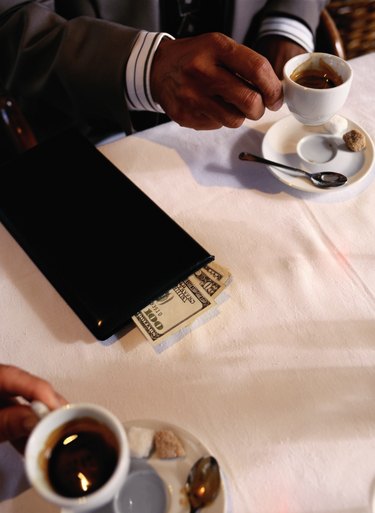
What started as a niche beverage in the Horn of Africa around the 15th century has graduated to a ubiquitous dining subculture. Worldwide, coffee is among the most valuable commodities, and caffeine, its vital ingredient, is the most commonly consumed psychoactive substance. More than half of American adults drink at least one cup daily. Whether a gourmet brew percolated with specialty apparatus or a generic mug-whisked instant, coffee remains a universal conclusion to dinner.
Coffee Tradition
Video of the Day
In the era of unbridled tobacco consumption, serving coffee after dinner provided a tacit signal for guests to light up cigarettes or cigars. At formal dinner parties, the practice still exists of serving coffee in separate lounges to men and women, usually accompanied by cigars or digestifs such as Cognac. Where smoking is not permitted or desired, coffee remains an appropriate method of balancing the palate after a particularly sweet dessert. In France, coffee is always served after dessert, not with it, and is savored at length before the check is requested.
Video of the Day
Health Benefits
Coffee aficionados argue that an after-dinner Robusta or Arabica brew is not so much indulgence as plain healthy living. Coffee is one of the single leading sources of antioxidants in the Western diet, absorbed more effortlessly into the bloodstream than other nutrients. Likewise, coffee increases the metabolic rate by up to 11 percent, improving fat burning after a heavy meal. Evidence also exists that coffee boosts cognitive brain function, including alertness, by facilitating the enhanced firing of neurotransmitters. After a long, sumptuous dinner, a quick shot of coffee is the ideal way to counter sluggishness and lethargy.
Myths Busted
Many diners shy away from the after-dinner coffee in the belief that even the shortest dose is responsible for indigestion, stomach pains or even heart palpitations. The real culprit of these symptoms is often overindulgence of foods that were too spicy or rich. Medical evidence shows that drinking an espresso after dinner slows digestion, better equipping the body to break down a heavy meal. In particular, caffeine slows the transfer of food from the stomach to the duodenum and increases metabolism. Contrary to popular belief, coffee does not cause stomach ulcers, although it can exacerbate heartburn in some people.
Cultural Considerations
Italian or French restaurants typically serve a short shot of espresso in a demitasse cup as their after-dinner coffee, delivering the perfect amount of rich roast flavor to complement a heavy dinner. While it is acceptable to add a dash of milk or cream (called a macchiato), it would be something of a faux pas to order a cappuccino after dinner. This frothy, foaming milk and coffee blend dusted with chocolate powder is strictly a morning drink; purists would never drink it after midday, because the milk is thought to hamper digestion. Italians do not drink it after any meal, even lunch.
- Woman’s Day: 7 Surprising Health Facts About Coffee
- The Kitchn: Dinner Party Etiquette: When to Serve Coffee and Tea
- Go Coffee Go: How to Brew the Perfect Cup of Coffee
- The Independent: Dylan Jones: "Ordering a Cappuccino After Dinner Is Fundamentally Wrong"
- Tuscan Traveler: Italian Food Rules – No Cappuccino After 10am
- Revealed Rome: Eleven Etiquette Mistakes (Not) to Make at an Italian Meal
- Huffington Post: 11 Reasons Why You Should Drink Coffee Every Day
- Authority Nutrition: Top 13 Evidence-Based Health Benefits of Coffee
- Etiquette Scholar: Dinner Party Etiquette
- Bonjour Paris: Dining Guide and Etiquette
- International Coffee Organization: The Story of Coffee
- Harvard School of Public Health: Ask the Expert: Coffee and Health